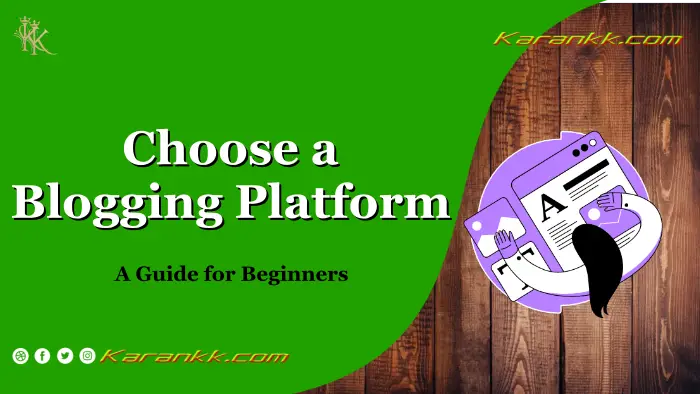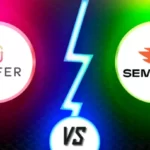Blogging has become a popular tool for people and companies to exchange information and engage with others online. With the multitude of blogging platforms available, it might be hard to find the ideal one for your purposes.
In this post, we will explore the advantages and drawbacks of several blogging platforms and give recommendations on how to pick the ideal one for your unique objectives.
WordPress
WordPress is one of the most popular blogging systems accessible and utilized by millions of websites throughout the globe.
It provides a broad variety of capabilities, including customized templates, plug-ins, and widgets.
WordPress is also user-friendly, making it straightforward for newbies to get started.
Pros
- customizable templates: WordPress gives dozens of customizable templates to pick from, enabling users to construct a unique and professional-looking website.
- Plug-ins and widgets: WordPress provides over 50,000 plug-ins and widgets to add functionality to your website, such as social network integration, e-commerce, and search engine optimization.
- User-friendly: WordPress is simple to use, even for novices, with an intuitive interface and useful guidelines and tutorials accessible.
Cons
- Cost: While WordPress is free to use, more features and plug-ins may need a cost.
- Security: WordPress is a common target for hackers, and users need to take precautions to safeguard the security of their websites.
- Updates: WordPress needs periodic updates to maintain security and functionality, which may require technical skills.
Blogger
Blogger is a free blogging platform owned by Google. It is easy to use, with a drag-and-drop interface, and is great for novices.
Pros
- Free: Blogger is a 100% free platform, making it an economical alternative for bloggers on a low budget.
- Simple interface: Blogger’s drag-and-drop interface makes it simple for newcomers to establish a blog without technical skills.
- Google integration: Blogger is connected with Google’s other services, such as Google Analytics and AdSense.
Cons
- Limited customization: While Blogger provides certain customization choices, it is limited compared to other systems such as WordPress.
- Limited features: Blogger has fewer capabilities and plug-ins than other platforms, making it less ideal for sophisticated websites.
- Ownership: As a free platform, Blogger is owned by Google, thus users do not have total control over their material.
Wix
Wix is a website builder that incorporates blogging features. It is user-friendly and provides a selection of customizable layouts.
Pros
- User-friendly: Wix is straightforward to use, with a drag-and-drop interface and a selection of tutorials and guidelines accessible.
- customizable templates: Wix provides a selection of customizable templates to pick from, enabling customers to construct a unique website.
- E-commerce: Wix has e-commerce features, making it appropriate for bloggers wishing to monetize their websites.
Cons
- Cost: While Wix provides a free plan, further features and capabilities cost a charge.
- Limited functionality: Wix’s blogging features are limited compared to specialist blogging systems like WordPress.
- SEO limitations: Wix’s SEO features are restricted compared to other platforms, making it less appropriate for bloggers trying to increase their search engine ranking.
Squarespace
Squarespace is a website builder that incorporates blogging features. It is popular among creatives and is noted for its artistically beautiful templates.
Pros
- Aesthetically pleasant templates: Squarespace provides a selection of aesthetically beautiful templates, making it great for bloggers wishing to construct a visually appealing website.
- Customizable: Squarespace provides a number of customization choices, enabling customers to design a unique website.
- E-commerce: Squarespace has e-commerce options, making it appropriate for bloggers wishing to monetize their websites.
Cons
- Cost: Squarespace is more costly than some other blogging platforms, with options beginning at $12 per month.
- Limited functionality: Squarespace’s blogging features are limited compared to specialist blogging systems such as WordPress.
- Technical limitations: Squarespace is not as versatile as other platforms, making it more difficult for skilled users to make specific adjustments.
Ghost
Ghost is a specialized blogging platform that focuses on simplicity and speed. It is great for bloggers that respect the clean, simple style.
Pros
- Simple and quick: Ghost is meant to be simple and fast, with an emphasis on creating and posting content.
- Customizable: Ghost provides a multitude of customization possibilities, enabling users to construct a unique website.
- SEO-friendly: Ghost is meant to be SEO-friendly, making it excellent for bloggers trying to boost their search engine ratings.
Cons
- Cost: While Ghost provides a free plan, extra features, and capabilities cost a subscription.
- Limited functionality: Ghost’s blogging skills are limited compared to specialist website builders such as Wix or Squarespace.
- Technical expertise: Ghost is less user-friendly than some other platforms, needing some technical knowledge to set up and adjust.
How to pick the best blogging platform
When picking a blogging platform, consider the following factors:
Conclusion
Choosing the ideal blogging platform for your purposes demands consideration of your objectives, budget, technical skills, and the desired amount of customization and functionality.
Consider the benefits and drawbacks of each platform and select the one that best meets your individual requirements and long-term ambitions.
Remember that switching platforms is feasible but may be time-consuming, so select cautiously.
Start a Blog and Make Money Online ( Free Full Guide )
- How to Start a Blog
- How to Choose a Niche
- How to Choose a Blogging Platform
- How to Choose the Perfect Domain Name
- How to Choose a Domain Name for a Personal Website
- How to Sign Up with Hostinger
- How to install WordPress in Hostinger
- How to Install GeneratePress Premium
- How to Install Essential Plugins
- Best Keyword Research Tool
- Create High-Quality and Engaging Content
- How to Optimize Your Content for SEO
- How to Monetize Your Blog
- How to Promote Your Blog
FAQ’s
Can I switch blogging systems once I have established my blog?
Yes, it is feasible to move blogging platforms, however, it may be time-consuming and may need technical expertise. Consider your long-term objectives when picking a platform, to prevent the necessity for switching in the future.
Do I need technical expertise to utilize a blogging platform?
Some systems, such as Wix and Blogger, are more user-friendly and need less technical expertise than others. However, all platforms will demand some amount of technical understanding, especially when it comes to customization and optimization.
Can I monetize my blog on any platform?
Most blogging sites include some type of revenue features, such as e-commerce or advertising. However, certain platforms, such as Squarespace, may be more restrictive in this aspect.






